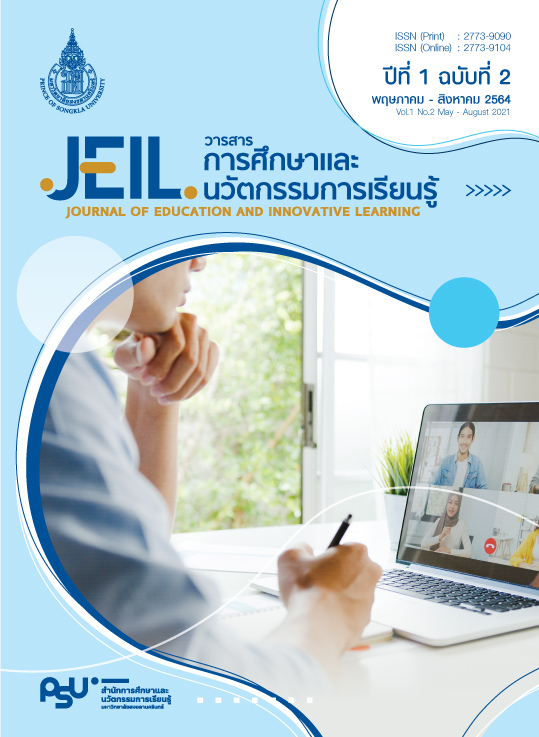สะเต็มศึกษาเพื่อการเรียนรู้ตลอดชีวิต: กรณีศึกษาเพื่อยกระดับผลิตภัณฑ์สร้างสรรค์จากกาบกล้วยเพื่อขับเคลื่อนเศรษฐกิจชุมชน
Main Article Content
บทคัดย่อ
การจัดการเรียนรู้ตามแนวทางสะเต็มศึกษาเป็นการบูรณาศาสตร์ที่สามารถนำไปสู่การขับเคลื่อนเพื่อการพัฒนาท้องถิ่นผ่านกระบวนการกระตุ้นและส่งเสริมศักยภาพการเรียนรู้ตลอดชีวิตของกลุ่มวิสาหกิจชุมชนขนาดเล็กซึ่งเป็นมิติหนึ่งของการจัดการเรียนรู้ในลักษณะกิจกรรมที่มีการถอดบทเรียนร่วมกัน วิเคราะห์ปัญหา นำไปสู่แนวทางการแก้ปัญหาตามแบบสะเต็มศึกษาซึ่งเป็นการบูรณาการศาสตร์ 4 กลุ่มสาขา ดังนี้ วิทยาศาสตร์ เทคโนโลยี วิศวกรรมศาสตร์ และคณิตศาสตร์ ได้มุ่งเน้นการแก้ปัญหาจากสถานการณ์จริง มีการวางแผนการดำเนินงานอย่างเป็นขั้นตอนและสามารถลงมือปฏิบัติได้จริง ผู้วิจัยได้จัดกิจกรรมการเรียนรู้ในลักษณะการแก้ปัญหาโดยใช้โครงการวิจัยเป็นฐาน เพื่อส่งเสริมทักษะด้านการคิดวิเคราะห์เพื่อแก้ปัญหา และการคิดสร้างสรรค์เพื่อสร้างผลิตภัณฑ์ใหม่ของกลุ่มวิสาหกิจชุมชนหัตถกรรมกาบกล้วย ผ่านการเรียนรู้ตามแนวคิดการออกแบบเชิงวิศวกรรม 5 ขั้นตอน ประกอบด้วย (1) การกำหนดปัญหา (2) การสืบค้นข้อมูลทฤษฎีและแนวคิดที่เกี่ยวข้อง (3) การวางแผนและพัฒนา (4) การทดสอบและประเมินผล และ (5) การนำเสนอผลลัพธ์และผลผลิตที่เกิดขึ้น ผลจากการศึกษา พบว่ากลุ่มวิสาหกิจชุมชนหัตถกรรมได้รับความรู้และสามารถประยุกต์ใช้แก้ปัญหา รวมทั้งสร้างมูลค่าเพิ่มวัตถุดิบจากฐานทรัพยากรชีวภาพในพื้นที่เพื่อยกระดับผลิตภัณฑ์สร้างสรรค์จากกาบกล้วยในการขับเคลื่อนเศรษฐกิจชุมชนได้อย่างยั่งยืน
Article Details

อนุญาตภายใต้เงื่อนไข Creative Commons Attribution-NonCommercial-NoDerivatives 4.0 International License.
เนื้อหาและข้อมูลในบทความที่ตีพิมพ์ในวารสารการศึกษาและนวัตกรรมการเรียนรู้ ถือเป็นข้อคิดเห็นและความรับผิดชอบของผู้เขียน ซึ่งกองบรรณาธิการวารสาร ไม่จำเป็นต้องเห็นด้วยหรือร่วมรับผิดชอบใด ๆ และไม่สงวนสิทธิ์การคัดลอกบทความเพื่อใช้ประโยชน์ทางวิชาการ แต่ให้อ้างอิงข้อมูลแสดงที่มาของบทความทุกครั้งที่นำไปใช้ประโยชน์
เอกสารอ้างอิง
Agricultural Technology and Innovation Management Institute. (2021, March 2021) STEM studies and organic agriculture development. Retrieved from https://www.nstda.or.th/agritec/seminar-stem-organic/ [in Thai]
Boonwatthanakul, C. (2016). Direction for providing nonformal and informal education for Thailand. Veridian E-Journal, Silpakorn University, 9(3), 984-1004. [in Thai]
Breiner, J. M., Harkness, S. S., Johnson, C. C., & Koehler, C. M. (2012). What is STEM? A discussion about conceptions of STEM in education and partnerships. School Science and Mathematics, 112(1), 3-11. doi:10.1111/j.1949-8594.2011.00109.x
Chaiya, S. (2019). The developing lifelong learning skills of students in the 21st century. Journal of Academic Education Science, 20(1), 168-180. [in Thai]
Chanaphan, C., Phongphitthaya, K., Arirat, W., & Sittisomboon, M. (2015). A model for the promotion of lifelong learning for informal education in Chaiyaphum province. Journal of Educational Administration, Khon Kaen University, 11(2) 157-165. [in Thai]
Department of Agricultural Extension. (2005). Community enterprises. Department of Agricultural Extension Ministry of Agriculture and Cooperatives. [in Thai]
Department of Alternative Energy Development and Efficiency, Ministry of Energy (n.d.). Solar heat generation transfer and dissemination of solar energy use. Retrieved from http://webkc.dede.go.th/testmax/node/4480 [in Thai]
Kelley, T. R., & Knowles, J. G. (2016). A conceptual framework for integrated STEM education. International Journal of STEM Education, 3(11). doi:10.1186/s40594-016-0046-z
Khuana, K., & Khuana, T. (2016). 21st Century informal education management. Education Journal Faculty of Education Kamphaengphet Rajabhat University, 1(1). 68-76. [in Thai]
Ministry of Education, (2008). Promotion of non-formal and informal education act, B.E. 2551 (2008). In Government Gazette Vol. 125, Part 41a. Retrieved form http://www.ops.moe.go.th/ops2017/attachments/article/147/7-%E0%B8%9E%E0%B8%A3%E0%B8%9A.%E0%B8%AA%E0%B9%88%E0%B8%87%E0%B9%80%E0%B8%AA%E0%B8%A3%E0%B8%B4%E0%B8%A1%E0%B8%81%E0%B8%B2%E0%B8%A3%E0%B8%A8%E0%B8%B6%E0%B8%81%E0%B8%A9%E0%B8%B2%E0%B8%99%E0%B8%AD%E0%B8%81%E0%B8%A3%E0%B8%B0%E0%B8%9A%E0%B8%9A%E0%B9%81%E0%B8%A5%E0%B8%B0%E0%B8%81%E0%B8%B2%E0%B8%A3%E0%B8%A8%E0%B8%B6%E0%B8%81%E0%B8%A9%E0%B8%B2%E0%B8%95%E0%B8%B2%E0%B8%A1%E0%B8%AD%E0%B8%B1%E0%B8%98%E0%B8%A2%E0%B8%B2%E0%B8%A8%E0%B8%B1%E0%B8%A2%20%E0%B8%9E.%E0%B8%A8.%202551.pdf [in Thai]
Nordstrom, N. M. (2008, July 28). Top 10 benefits of lifelong learning. Retrieved from http://www.selfgrowth.com/articles/Top_10_Benefits_of_Lifelong_Learning.html
Organization for Economic Co-operation and Development. (2021). OECD future of education and skills 2030 OECD learning compass 2030. Retrieved from http://www.oecd.org/education/2030/
Prasertsan, S. (2015). STEM Education: new challenges of thai education. Bangkok: Poopanpunya Project. [in Thai]
STEM Education National Center. (2015). Guidelines of STEM network. Institute for the Promotion of Teaching Science and Technology, Ministry of Education. Bangkok [in Thai]
Vasquez, J. A., Snelder, C., & Comer, M. (2013). STEM lesson essentials: grades 3-8: integrating science, technology, engineering, and mathematics. Portsmouth, NH: Heinemann


